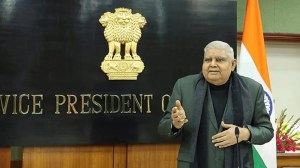US Supreme Court reverses order which provided relief to Government of India in dispute over $1.2 billion award for failed 2005 Devas-Antrix satellite deal
The UPA government annulled the 2005 Devas-Antrix satellite deal in February 2011, citing the requirement of space spectrum allocated for the satellite services of Devas for security needs.
 The UPA government annulled the 2005 Devas-Antrix satellite deal in February 2011, citing the requirement of space spectrum allocated for the satellite services of Devas for security needs. (Source: File)
The UPA government annulled the 2005 Devas-Antrix satellite deal in February 2011, citing the requirement of space spectrum allocated for the satellite services of Devas for security needs. (Source: File)In a setback for the Government of India and Antrix Corporation – a commercial arm of the Indian Space Research Organisation (Isro) – the US Supreme Court has rolled back a reprieve given in 2023 by a US appeals court in a legal battle over a compensation claim of $1.2 billion by start-up firm Devas Multimedia for a failed satellite deal from the year 2005.
The US Court of Appeals for the Ninth Circuit had ruled on August 1, 2023, that Antrix Corp, as an alter ego of India, must have some amount of business in the US to be subjected to the jurisdiction of US courts under the Foreign Sovereign Immunities Act (FSIA) of the US.
The August 2023 order of the appeals court was expected to end efforts by Devas Multimedia to enforce in the United States a $1.2 billion compensation award made by an arbitration tribunal of the International Chamber of Commerce on September 14, 2015. The award had been confirmed by the US court for the Western District of Washington on October 27, 2020.
The US Supreme Court, in an order dated June 5, following a plea by Devas Multimedia against the August 2023 appeals court order, has ruled that the appeals court had erred in its ruling that a firm must have some minimum business in the US for it to be liable to be sued in US courts.
The US Supreme Court, which reserved its orders in the matter on March 3, 2025, has stated in its order on Thursday that US courts have jurisdiction over foreign entities “when an immunity exception applies and service is proper”.
“The FSIA does not require proof of ‘minimum contacts’ over and above the contacts already required by the Act’s enumerated exceptions to foreign sovereign immunity,” the US Supreme Court has ruled while reversing the 2023 order of the appeals court. The US SC has referred the case back to the Ninth Circuit for fresh consideration of the matter.
“Antrix’s alternative arguments – that the Fifth Amendment itself requires a showing of minimum contacts, that the claims at issue do not fall within the FSIA’s arbitration exception, and that the suit should be dismissed under forum non conveniens – were not addressed below by the Ninth Circuit. This Court declines to address them in the first instance,” the US SC said in its June 5 order.
Earlier during the hearing of the case in the US SC, India had asked the court to respect the comity of nations by upholding the August 2023 order for setting aside the $1.2 billion arbitration award against Antrix Corp.
“India has great interest in ensuring that the set-aside decisions, and the Supreme Court of India decision on which they are based, are afforded comity and due respect from the courts of the United States,” said a written submission made by the Government of India to the US SC, ahead of the commencement of an oral hearing on March 3 by the US SC.
When the oral arguments in the dispute over the $1.2 billion arbitration award were allowed by a bench of the US Supreme Court on March 3, the counsel for Antrix argued that the case “serves as an irritant to the Indian government”.
The counsel for Antrix Corp, Carter G Philips, said during the oral arguments that the Antrix-Devas agreement of 2005 – which was cancelled for security reasons during the tenure of the UPA government in 2011 – did not have any US interests or anything “that remotely affects either interstate or foreign commerce”.
The Antrix Corp counsel argued that only courts in India could deal with the matter according to the original agreement and that the Supreme Court of India had already set aside the ICC arbitration award in favour of Devas Multimedia.
The acting Solicitor General for the US Department of Justice, Sarah M Harris, who argued as an amicus curiae on behalf of the US investors in Devas Multimedia in the US SC said that the US appeals court had erred in ruling that a foreign entity like Antrix Corp should have some minimum contacts in terms of business in the US to be subject to US courts.
She said that the US FSIA says “when personal jurisdiction over a foreign state shall exist and omits any minimum contacts requirement. That is all this court needs to hold to reverse. The Ninth Circuit’s contrary statutory holding disregards that text, and no one, even Respondent, appears to defend it.”
Following the filing of the case in the US SC against the appeals court order by Devas Multimedia investors, several business bodies like the US Council for International Business, the Chamber of Commerce of the USA and the American Petroleum Institute supported the stand of the investors in Devas Multimedia – that an enterprise does not require to have business interests in the US for federal courts to confirm international arbitration awards.
The Ninth Circuit court’s order that a foreign entity must have minimum contact or presence in the US to be liable to suits “undermines (the US) Congress’s goal of creating a uniform body of law concerning the amenability of a foreign sovereign to suit in United States courts,” the foreign investors in Devas Multimedia argued.
The August 1, 2023, order of the US appeals court was a major relief for Antrix Corp and the Indian government, which is fighting legal battles all over the world in connection with a 2011 decision of the UPA government to annul a satellite deal with Devas Multimedia.
Antrix had argued that “there is no longer an award to enforce because the Delhi High Court – the court of competent jurisdiction to determine the award’s enforceability – set it aside, a decision affirmed by the Indian Supreme Court.”
Background to the legal battle in the US
The UPA government annulled the 2005 Devas-Antrix satellite deal in February 2011, citing the requirement of space spectrum allocated for the satellite services of Devas for security needs. The deal was cancelled after it was cited as a “sweetheart deal” and another instance of corruption under the UPA regime after the 2G scam.
Under the failed 2005 Antrix-Devas deal, Isro was supposed to lease two communication satellites for 12 years for Rs 167 crore to Devas Multimedia. The start-up was to provide multimedia services to mobile platforms in India using the space band or S-band transponders on Isro’s GSAT 6 and 6A satellites.
After the NDA government came to power in 2014, the Central Bureau of Investigation (CBI) and the Enforcement Directorate (ED) began seriously investigating the deal, even as the foreign investors in Devas Multimedia – The German telecom major Deutsche Telekom, three Mauritius investors, and Devas Multimedia itself – approached various international tribunals seeking compensation for the failed deal.
Devas Multimedia was awarded $1.2 billion by the International Chamber of Commerce on September 14, 2015. Deutsche Telekom was awarded $101 million in compensation by the Permanent Court of Arbitration in Geneva, and the Mauritius investors were awarded $111 million by the United Nations Commission on International Trade Law.
The National Company Law Tribunal (NCLT) in India ordered the liquidation of Devas Multimedia on May 25, 2021, citing fraud in its creation. The NCLT order was upheld by the Supreme Court of India on January 17, 2022.












